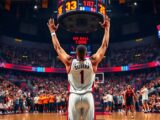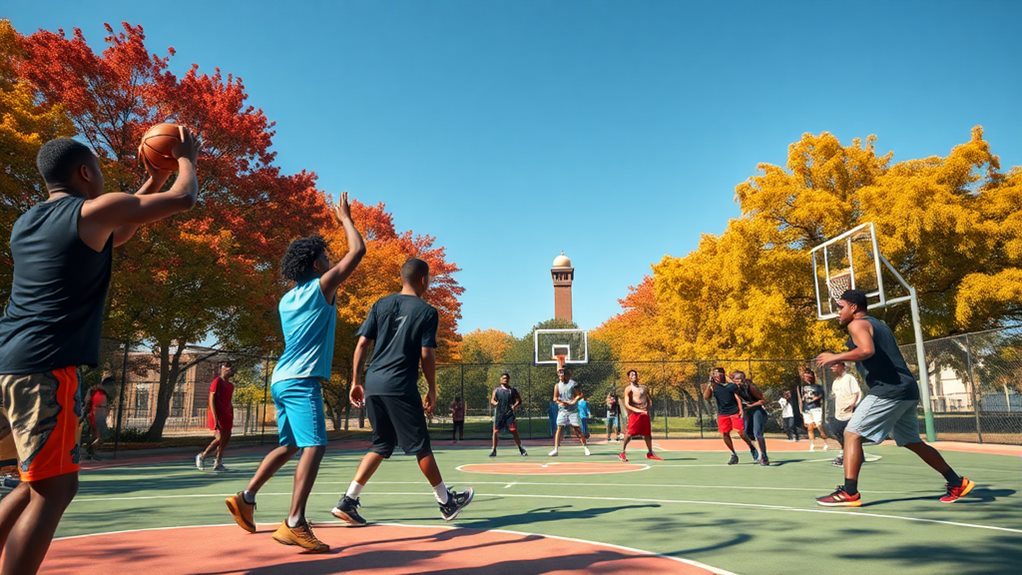
How to Get Good at Basketball: Tips for Improvement
December 8, 2024To get good at basketball, focus on skill development, conditioning, and mental strength. Practice shooting, dribbling, and passing regularly, and incorporate drills that enhance your agility and strength. Don't forget to improve your endurance through cardio workouts and maintain a balanced diet. Pay attention to your mental game by visualizing success and practicing positive self-talk. Remember to communicate well with your teammates and foster good relationships on the court. Prioritize recovery with ample sleep and flexibility routines to guarantee peak performance. Stick around to uncover even more strategies and tips to elevate your game.
Movement Fundamentals
When you step onto the court, mastering movement fundamentals is key to your success in basketball. Your flexibility plays an important role here; it enhances joint mobility and helps prevent injuries, especially in those often-stressed ankle joints.
Data analytics can also inform your training regimen, helping you understand which areas to focus on for peak performance. You'll want to focus on strength training too, as building leg strength improves your vertical jump and allows you to absorb landing forces more effectively.
Maintaining proper posture is essential as well. Good posture guarantees spinal joint integrity and reduces the risk of injuries over time.
Don't underestimate the importance of balance; it's crucial for body control, especially in challenging positions on the court. This is closely linked to core stability, which helps you execute movements efficiently.
Agility training shouldn't be overlooked either. It allows you to make quick changes in speed and direction, necessary for effective performance during games and practices.
Training Techniques
To get better at basketball, you need a consistent practice routine that focuses on your specific skills.
Embrace a variety of drills to enhance your ball control and shooting techniques, as consistent effort is essential for refining skills.
Set aside time multiple times a week to target areas like shooting or dribbling, ensuring you're making real progress.
Consistent Practice Routine
A well-structured practice routine is vital for mastering basketball skills. Start by establishing a consistent practice routine, dedicating at least 1-2 hours multiple times a week.
Focus on key areas like shooting, dribbling, and passing to guarantee balanced skill development. Incorporate a variety of drills that challenge both your strengths and weaknesses; this will prevent you from falling into autopilot movements.
To simulate real gameplay conditions, utilize game-like scenarios during your practice. Incorporating scrimmages and competitive drills can greatly improve your decision-making skills, making you more prepared for actual games.
Don't forget to track your progress—keeping a practice journal or using apps can help you monitor your skills and maintain motivation.
Recovery is just as important as practice. Prioritize activities like stretching or foam rolling to support muscle recovery and enhance your overall performance on the court.
Targeted Skill Development
Focusing on targeted skill development is crucial for becoming a better basketball player. Start by mastering one fundamental skill at a time, like shooting or dribbling. Dedicate 1-2 hours specifically to that skill during your practice sessions for effective improvement.
Regularly incorporate drills that address your weaknesses; for example, practice dribbling with your non-dominant hand to enhance your overall ball-handling skills.
Utilize video analysis to review your performance. This can help you identify areas for improvement and refine your technique.
Scheduling consistent practice sessions is important; aim for at least 3-5 times a week to build muscle memory and guarantee steady progress in skill development.
Engaging in competitive scrimmages or drills against stronger players can challenge you and accelerate your learning curve. Real-game scenarios provide invaluable experience, pushing you to apply your targeted skill development in pressure situations.
Rest and Recovery
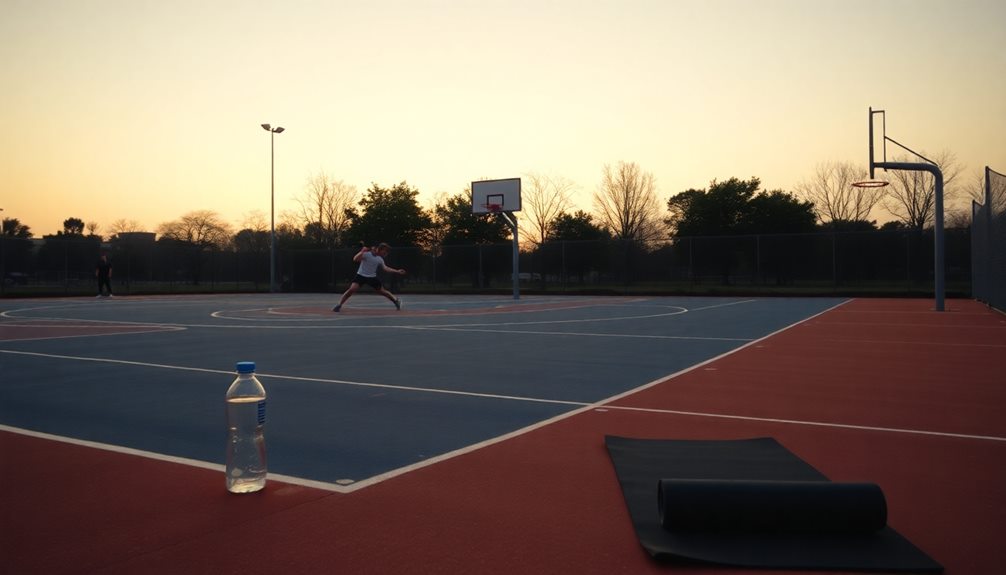
Rest and recovery play an essential role in your basketball performance and overall athleticism. Prioritizing at least eight uninterrupted hours of sleep each night is imperative, as it helps replenish energy stores and repair tissues. Without adequate sleep, your performance may suffer, and you could be more prone to fatigue and injury.
Additionally, incorporating a variety of cardio workouts can enhance your stamina and recovery, allowing you to perform at your best during games.
Staying hydrated is another key factor. Aim for at least half your body weight in ounces of water daily to maintain ideal hydration levels, which can greatly impact your endurance and focus on the court.
Incorporating flexibility activities like foam rolling and stretching into your routine can also enhance recovery by reducing muscle soreness and improving joint mobility.
Consider adding consistent sports massage therapy to your regimen, as it helps alleviate muscle tension and soreness, promoting quicker recovery times.
Finally, don't underestimate the power of a balanced diet. A diet rich in proteins, carbohydrates, and healthy fats is essential for replenishing energy stores and supporting muscle repair post-exercise.
Skill Development
To get better at basketball, you need to master the fundamental skills and establish a consistent practice routine.
Understanding diverse playing styles from around the world can also enhance your game.
Incorporating video analysis can help you fine-tune your shooting mechanics and identify areas for improvement.
Focus on these aspects, and you'll see significant progress on the court.
Master Fundamental Skills
Mastering fundamental skills is essential for any aspiring basketball player, as these basics lay the groundwork for advanced techniques and effective gameplay. Start by focusing on shooting, dribbling, and passing—these are the core skills you'll need.
To improve your shooting, practice with the BEEF method: Balance, Eyes, Elbow, and Follow-through. This will boost your accuracy and confidence on the court.
Next, develop ambidexterity in your ball handling. Dedicate time each day to dribbling drills with both hands. This not only enhances your versatility but also makes you less predictable to defenders.
Identify any weaknesses you have and engage in targeted drills to address them, whether it's finishing at the rim or improving your defensive positioning.
Lastly, don't underestimate the value of feedback. Utilize coaching insights, video analysis, and online training platforms to gain valuable perspectives on your skills.
These resources can help you master fundamental skills more efficiently and accelerate your improvement. By committing to these basics, you'll set yourself up for success as you continue to develop as a basketball player.
Consistent Practice Routine
Establishing a consistent practice routine is vital for your skill development in basketball. Dedicate at least 1-2 hours each day to focus on specific skills like shooting, dribbling, and defensive techniques.
Incorporate a variety of drills that target different aspects of your game. This approach guarantees you practice both fundamental skills and advanced techniques, fostering well-rounded development.
Set measurable goals for each session, such as making a minimum number of free throws or completing a specific number of dribble repetitions with both hands. These goals give you something tangible to work towards and can greatly enhance your focus during practice.
Utilize game-like scenarios to simulate real match conditions. Practicing under pressure improves your decision-making skills and helps you perform better in actual games.
Regularly assess your progress by recording practice outcomes. Reflecting on your strengths and weaknesses allows you to make targeted improvements in future sessions.
Video Analysis Techniques
Incorporating video analysis into your training can dramatically enhance your basketball skills. By utilizing video analysis software, you can break down your shooting mechanics, allowing you to visually identify flaws in your form. This insight helps you make necessary adjustments for improved accuracy.
Recording your practice sessions is also essential; it lets you assess your ball handling skills, focusing on dribbling techniques and decision-making under pressure, which enhances your overall gameplay effectiveness.
Analyzing game footage is vital to evaluate your defensive positioning and movement. This practice helps you develop a better understanding of your defensive responsibilities and pinpoint areas for improvement.
Additionally, comparing your gameplay videos with those of elite players can be enlightening. It allows you to identify best practices and techniques that you can incorporate into your training routine.
Don't forget to use slow-motion playback to scrutinize your footwork and balance during shooting and driving. This technique provides clear insights into how these aspects impact your performance and shot success rate.
Shooting Strategies
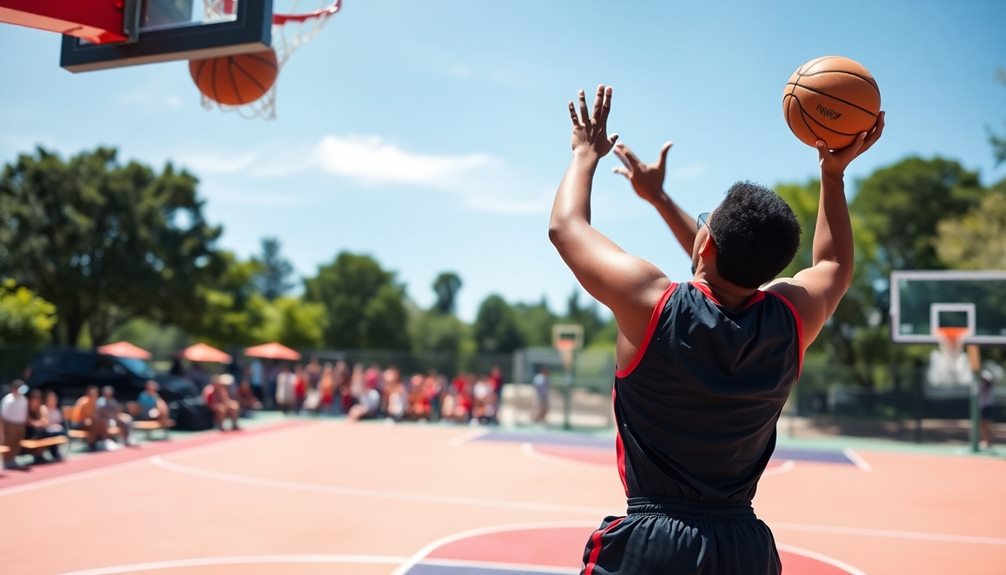
Shooting a basketball can feel like an art form, and developing effective shooting strategies is essential for any player looking to improve their game.
To achieve consistent shooting, you need to focus on a few key techniques that will enhance your accuracy and confidence on the court. Understanding the evolution of shooting techniques and the impact of innovations, like the introduction of the three-point line, can also provide valuable insights into modern shooting strategies impact of shooting innovations.
- Master the BEEF method—Balance, Eyes, Elbow, Follow-through—to guarantee a consistent shooting form.
- Keep your shooting elbow aligned under the ball to promote effective lift.
- Regularly practice shooting from various spots on the court to build adaptability.
- Gradually increase your shooting range, starting from closer distances for a strong foundation.
- Hold your follow-through until the ball hits the rim to reinforce proper mechanics.
Ball Handling Skills
Ball handling skills are essential for any basketball player looking to elevate their game. To become better at basketball, you need to develop ambidexterity by consistently dribbling with both hands during practice. This enhances your overall ball control and versatility on the court.
Incorporate cone drills into your training routine to improve your agility and precision while dribbling, allowing for better maneuverability in game situations. Additionally, incorporating cardio training into your regimen will support your stamina and enhance your performance during intense gameplay.
Don't forget to perform stationary ball handling drills focused on maintaining a low dribble, as this promotes better control and readiness for quick movements.
Mixing in a variety of dribbling techniques, such as crossovers and behind-the-back moves, will expand your skill set and keep defenders guessing during gameplay.
Defensive Tactics
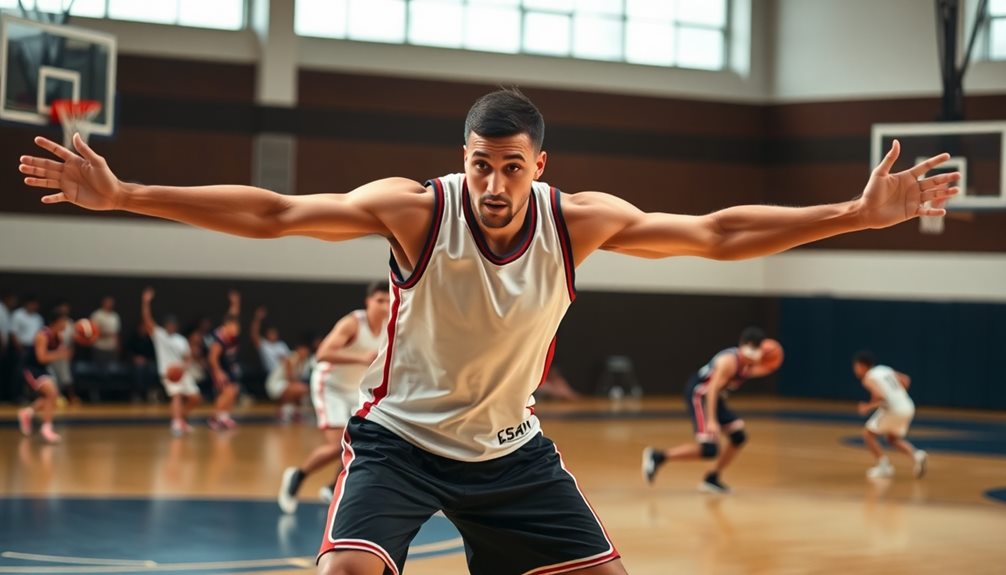
After sharpening your ball handling skills, it's time to focus on your defensive tactics. Mastering defensive concepts is vital for becoming a well-rounded player, especially in an era where evolving defensive strategies are essential to counteract modern offenses.
Here are some essential Tips To Improve your defense:
- Maintain a low stance to enhance your lateral movement and stability, allowing for quicker reactions.
- Utilize closeout techniques effectively by approaching shooters with high hands to contest shots without allowing easy drives.
- Develop anticipation skills by studying your opponents' tendencies through film analysis; this helps you intercept passes and position yourself better.
- Engage in shadowing drills that emphasize footwork and positioning, enabling you to stay glued to your assigned player and limit their scoring chances.
- Practice communication with your teammates during drills; effective verbal and non-verbal cues can greatly elevate your overall defensive effectiveness.
Conditioning and Endurance
To excel in basketball, you can't overlook the importance of conditioning and endurance. Incorporating strength training, interval workouts, and agility drills into your routine will elevate your game and keep you injury-free.
Focus on these elements to enhance your performance on the court and outlast your competition. Additionally, implementing endurance training methods will help you build stamina, ensuring you can meet the physical demands of the game.
Regularly practicing agility and coordination workouts will further improve your ability to react and adapt during intense gameplay.
Interval Training Techniques
Interval training is a powerful method for enhancing your basketball conditioning and endurance, perfectly suited to the sport's stop-and-start dynamics.
This training approach effectively boosts both your aerobic and anaerobic fitness, improving your performance on the court. To maximize your results, consider incorporating High-Intensity Interval Training (HIIT) into your routine.
Here are some tips to get you started:
- Alternate between high-intensity bursts (e.g., 30 seconds of sprinting) and recovery periods (e.g., 1 minute of walking).
- Aim for 20-30 minutes of interval training sessions, 2-3 times a week.
- Utilize drills like shuttle runs, suicides, or court sprints for agility and speed.
- Monitor your heart rate, targeting 80-90% of your maximum during high-intensity intervals.
- Focus on building endurance while enhancing your strength and conditioning.
Strength Training Importance
Building on your conditioning through interval training, strength training plays an essential role in your overall basketball performance. Incorporating strength training 3-5 times a week can greatly enhance your game. Focus on upper body, core, and lower body exercises to improve your physical fitness and reduce injury risk.
Key lower body exercises like squats, lunges, and deadlifts are imperative for developing the strength necessary to absorb contact during play and boost your explosive movements. A strong lower body not only helps you jump higher but also allows you to pivot and cut more effectively on the court.
Don't overlook your core; it's critical for maintaining balance and stability, enabling you to execute skills with precision. A strong core also helps you absorb physical contact, making you more resilient during intense games.
Combining skill workouts with strength training and conditioning sessions is the best approach. This integration guarantees you develop both your technical abilities and physical fitness simultaneously, leading to a well-rounded game.
Embrace strength training as a key component of your routine, and watch your basketball performance soar.
Agility and Speed Drills
Agility and speed are essential elements of basketball that can greatly impact your performance on the court. To enhance your game, incorporate specific drills into your training routine.
Here are some effective strategies:
- Agility ladder drills: These can improve foot speed, coordination, and overall agility, with studies showing a potential quickness enhancement of up to 15%.
- Cone drills: Try T-drills or shuttle runs to develop rapid directional changes, vital for moving efficiently during a game.
- Plyometric exercises: Combine box jumps and lateral bounds with sprint intervals to boost explosive power and cardiovascular endurance.
- High-intensity interval training (HIIT): Mimic the stop-and-go nature of basketball to improve both aerobic and anaerobic fitness.
- Progress tracking: Regularly time your sprints and measure agility drill performance, aiming for a 5-10% improvement over each training cycle.
Mental Toughness
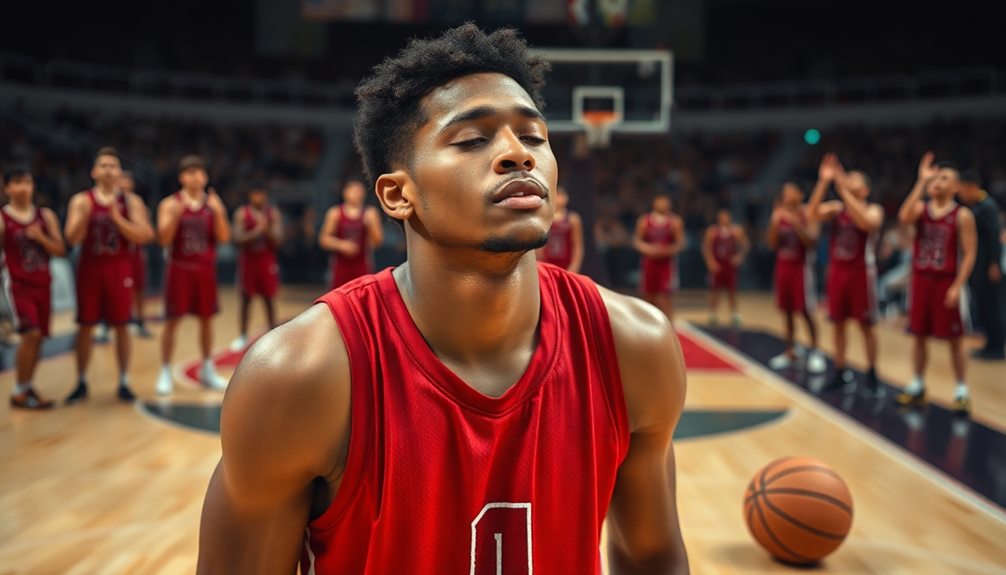
Mental toughness is an essential attribute that can set you apart on the basketball court, especially when the stakes are high. It allows you to maintain focus and composure under pressure, and studies show that athletes practicing mental skills can boost performance by up to 20%.
To develop this toughness, incorporate resilience training into your program by regularly exposing yourself to challenging situations, similar to how athletes prioritize quality training sessions to enhance their performance. This will help you overcome adversity, just like elite athletes who thrive in high-stakes scenarios.
Visualization techniques are also important. Approximately 90% of top athletes use mental rehearsal to envision successful plays and strategies, which can greatly enhance your performance.
Additionally, practice affirmations and positive self-talk to reduce anxiety and build confidence—two key elements for staying mentally tough during games.
Engaging in mindfulness practices can further improve your concentration and decision-making skills, essential components of a high basketball IQ.
Teamwork and Communication
While mental toughness lays the foundation for individual performance, teamwork and communication take your game to the next level. Effective basketball relies on clear verbal and non-verbal cues, enhancing on-court chemistry and decision-making under pressure.
As emphasized by the YMCA's focus on holistic development, when you and your teammates communicate well, you can quickly adapt to the game's changing dynamics, leading to higher win rates.
To improve your teamwork and communication, consider these strategies:
- Practice team drills regularly to build trust and support among players.
- Engage in team-building activities off the court to strengthen relationships and boost morale.
- Develop an intuitive understanding of each other's playing styles through consistent practice.
- Encourage open dialogue during games to help everyone feel involved and informed.
- Utilize hand signals or gestures for silent communication during intense moments.
Conclusion
So, you've got the fundamentals down, you've trained hard, and you're ready to step onto the court. But what if I told you that the real game-changer lies not just in your skills, but in your mindset? Imagine sinking that game-winning shot, your heart racing as the crowd erupts. It's not just about practice—it's about believing in yourself and your team. Keep pushing, stay focused, and watch how every ounce of effort transforms your game. Are you ready?


